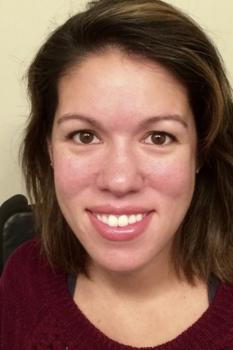Boardman ’08 ’11M Uses Arcadia Experience to Help Today’s Youth

As a first-year Biology student, Michele Boardman ’08 ’11M wasn’t sure if she could live on campus when she matriculated in 2004. She has always used a wheelchair to get around, and at 18-years-old she was uncertain about her ability to live on her own.
Throughout her time at Arcadia as an undergraduate and graduate student, Boardman worked with the University to make campus more accessible to those with mobility issues, including installing automatic doors in buildings and making the elevator in Boyer Hall more accessible. She worked with advisors to set up areas of refuge, where students with mobility issues could take safety during disasters, as well as organize signage to direct students to those locations.
“My first month living in the resident hall, the fire alarm went off at 2 a.m. because someone burnt popcorn,” said Boardman. “At that time, the discussions about what students with disabilities need really hadn’t been had. My roommate ended up having to carry me down two flights of steps on her back for that first alarm. I ended up using the fire safe room when the alarms would go off, which were never really anything serious—just some more burnt popcorn.”
Boardman credits Linda Pizzi, assistant dean of Academic Development, for helping her have the courage to live in modified housing in Knight Hall beginning her sophomore year, which included its own automatic door opening system.
“I wouldn’t be who I am today without Linda,” said Boardman. “She helped me develop my self-advocacy skills. I didn’t have a lot of confidence in myself, and she helped me to become confident so I could speak up about my needs.”
This confidence led Boardman to seek answers about her Social Security benefits and employment before graduating from the Master of Arts in Counseling program at Arcadia. As a benefits recipient, she wondered how working full-time might impact the funds and services she received but found assistance with AHEDD, a private, nonprofit organization providing employment services for people with disabilities.
As an employment coordinator at AHEDD, located in Jenkintown, Boardman now assists youth with disabilities who have many of the same questions she did.
“There are so many myths and misconceptions around employment,” said Boardman. Among those myths: the loss of benefits from full-time employment or that there’s a limit of 20 hours per week. “Work certainly does impact benefits, but at least if individuals with disabilities have the knowledge and they have the understanding of what’s going to happen, they can make good financial decisions about their careers and their lives.”
Boardman is also project director for the Work Incentive Counseling program at AHEDD, which helps individuals ages 14 to 30 with disabilities understand what programs and services are available through federal, state, and local governments. It has been funded by the Pew Charitable Trust Foundation since 2001.
“We talk about the impact of work on their benefits,” said Boardman, including healthcare. “There’s a lot of fear about working, and part of our program is to empower individuals to increase their financial self-sufficiency, make a life for themselves, and reach their career goals.”

